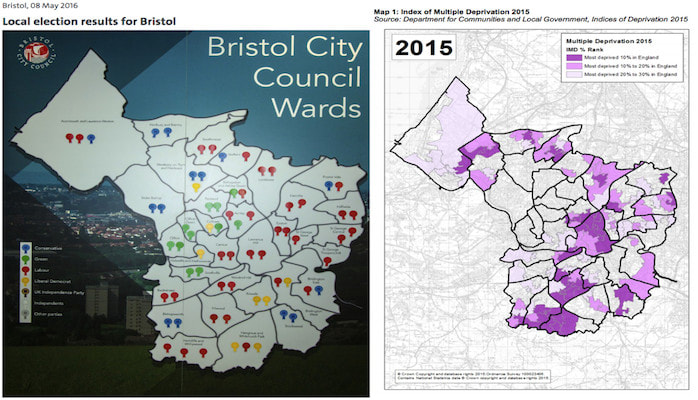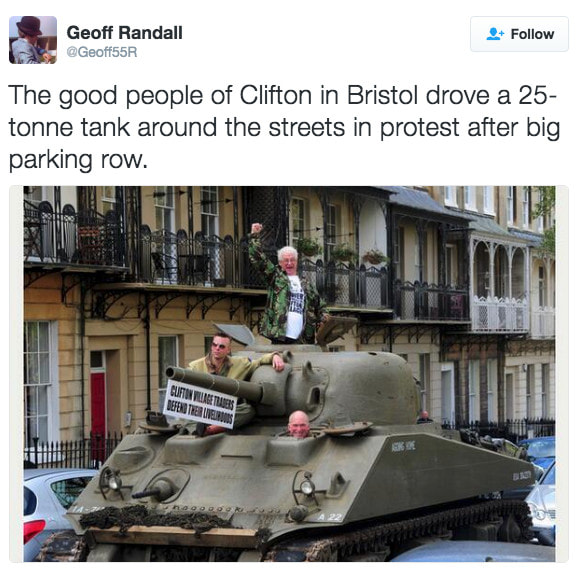|
The maps above show clearly how voting preferences in Bristol correlate closely with deprivation. What's interesting to me is the location of those who prioritise green issues: those who live in wealthy, central Bristol. That deprivation correlates with people's priorities is not new - Maslow famously illustrated this in his Hierarchy of Human Need - but it raises a fundamental challenge we face if we are to address the catastrophic impacts many are projecting will happen if we don't act on green issues. Deprivation is a fundamental challenge for the green agenda Bristol has just voted in a new Labour Mayor, Marvin Rees, and voted out Bristol's first elected Mayor, the Independent (and green) architect, developer and social entrepreneur, George Ferguson. Turnout was double what it was at the last election. It was still a two horse race, and the numbers who voted for George Ferguson appear about the same, but the substantially increased turnout, particularly from Labour voters, was what made the difference. In so doing the people of Bristol have sent a strong message not just about about equality, but also, perhaps unconsciously, about the environment. It's not possible to tell whether people were voting Mr Rees in or Mr Ferguson out - it's likely to be a bit of both - but what has been in evidence has been the level of dissatisfaction that some of Mr Ferguson's initiatives have prompted, and particularly on the most mundane and all-pervasive issue of them all: parking. What has been made resoundingly clear is that a majority of people in Bristol, European Green Capital 2015, appear not to prioritise green issues over reducing car use. A majority of people in Bristol - European Green Capital 2015 - appear not to prioritise green issues over reducing car use It was the "good people of Clifton", the wealthiest neighbourhood in Bristol, who made the loudest statement on parking by driving a tank around the city in protest - though a light-hearted gesture, the Tweet below gives you a flavour of the strength of feeling - but it was the quieter Labour majority who moved Mr Ferguson out of office. This reaction against Mr Ferguson was not unexpected and it won't be to him either. He invited fellow architect and three times Mayor of Curitiba, Jaime Lerner, over to speak at Bristol's Academy of Urbanism Conference back in 2014. Mr Lerner cited the Mayor of Bogotá, Enrique Peñalosa, who was initially voted in on a landslide, but who then carried out a series of major initiatives to improve the environment, most famously perhaps the Transmilenio transport network, which radically reduced car traffic and pollution, but also prompted rioting due to issues such as bus fares and lack of facilities. He was voted out at the next election. Until the voting public is on side, leadership on longer term green issues appears to be political suicide.
Until the voting public is on side, leadership on longer term green issues appears to be political suicide As someone who has worked in the environmental field for over a decade I have been immersed in stories day in and day out about the growing ecological debt we are in and the increasingly worse perils that we are likely to face. Somewhat naively, it's only recently that I've realised others have not shared in that experience and therefore are unlikely to prioritise these issues as I do. The voting in of a Labour Mayor in London (against a Green Tory) suggests a broader shift in public mood in our nation's major wealthy cities. Many argue that we can't address ecological issues without addressing equality. The Green Party's slogan is "For the Common Good" for a reason. The question is whether the voting public and Bristol and London's new Labour Mayors will prioritise green issues alongside equality, or whether one will trump the other. Given our short-term political time horizons, the need for mainstream education to adopt ecological literacy as a core subject has never been greater. This blog was first published on May 26, 2016 Comments are closed.
|



